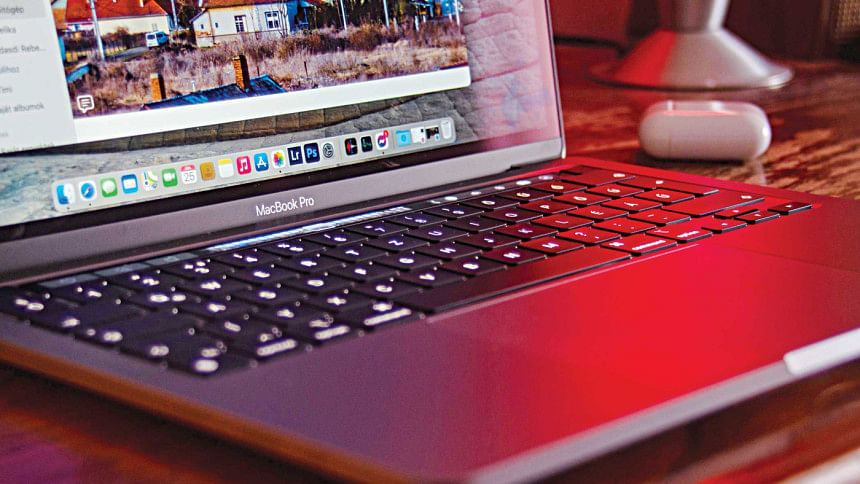MacBook Pro: A big step forward

Last November when Apple was announcing their M1 MacBook, I was thinking what these guys are talking about, they just showed us a bunch of graphs that were so ambiguous and had no data on them, they didn't talk about what PCs these M1 chips were beating up, it just said it was significantly faster. But now I know they did it on purpose because they knew that once we users would get this in our hands, we could see for ourselves. And not only this is a big performance chunk compared to any Ultrabook that's on the market but this is a big jump in tech history, period. This is a revolutionary jump in CPU performance using a 10-watt chip.
Going into the details, Apple is using the same technology that they use for iPhone and iPad chips. That means these Mac's pick up the things that Apple was good at on those computers like they're very fast, yet managed to have great battery life. It also means they can run iPhone and iPad apps, which is interesting. But apple to apple comparison with other windows laptops will never be possible (just like iPhone) because of the close integration of M1 inside. That's why Apple communicate user experience rather than feature stats. Still, to give you assurance I ran benchmark tests and this M1 is a beast.
Let's focus on three key things
Performance:
Performance is great. Animations are buttery smooth; apple own apps are faster than ever. File transfer is faster, faster image editing etc. No complaint about a day to day job and basic video or photo editing.
Now if you're a video editor, you're going to buy a MacBook Pro 16 right? You want the dedicated GPU, and you still should. But you can edit videos on this mac, specifically with final cuts since it's been optimized and runs great. I was able to go through a 4k timeline, scrubbing through it, like it was nothing and beating out last year's MacBook Pro 13 [2019] It was just remarkable.

Battery life:
Battery life for these new Macs is incredible and it's only gonna get better as more and more apps will be optimized for Apple silicon. One thing you need to consider, when Rosetta kicks into work, you drain the battery a bit faster as more resources are being used. I'm getting like eight hours of use for actual work not just watching video compared to the four or five that I used to get with the previous MacBook. Instant wakeup works perfectly, as soon as you open the laptop, it's automatically on. And just like the iPhone when you have it sitting in the corner on idle, it barely drains any battery which is impressive for a laptop.
Compatibility:
You need to remember one thing here; these are first-generation devices so who is buying these will be something like a beta tester. Every upcoming mac will be better than this. So, if you are not a heavy-duty user and are willing to upgrade your old MacBook now, this is the device you can go for.
We have three kinds of apps in the new MacBook.
Optimized apps:
these are mainly apples own apps and optimized properly for the M1 chipset. These are blazing fast and performance-wise zero issues and complaints.
Then come non-optimized apps, running through rosette 2. M1 is an ARM processor which has completely different instruction sets than Intel processors. On these Macs, Apple has a translation layer called Rosetta 2 under the hood and it is important for understanding what happens when you push these machines. Every time you are using a non-optimized app, Rosetta will convert them for M1 chip, and you will be able to run these in your new MacBook. Everything is happening behind the scenes and in split seconds. In most cases, you won't even notice any performance gap. All apps will be optimized eventually. But it will take time. The truth is all these are running fine with some minor hiccups. Which is ok and expected.
Lastly in M1 through MacOS Big Sur, you can use iOS and iPadOS apps. But these are bad. Some of the developers do not allow you to use these apps in Mac and most cases, you won't find them user friendly. Overall, they are not ready yet to be used in Mac devices seamlessly.
Verdict:
This is a huge step forward for Apple. And this is what they've been waiting for years to finally create the MacBook silent, which has amazing battery life and has performance like nothing else out there. I usually don't recommend first-generation products but I'm going to recommend this one. I think if you know what you're getting yourself into and not going to use any hardcore heavy applications, you're going to love this thing. As time goes forward, more apps are optimized to work with Apple silicone properly instead of using Rosetta, this thing is just going to get stronger and stronger and stronger.

 For all latest news, follow The Daily Star's Google News channel.
For all latest news, follow The Daily Star's Google News channel. 



Comments